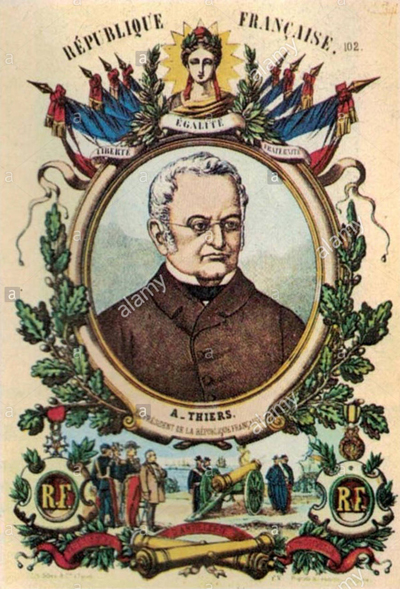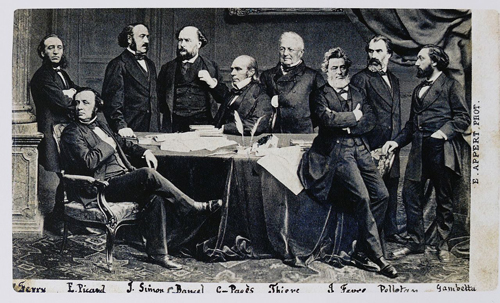 |
The
authorities
felt
helpless
in
the
whirlwind
of
what
soon
became
a
full-scale
revolt.
Policemen
avoided
working-class districts,
where
some
been
set
upon
violently.
A
mob
forced
the
warden
of
Sainte
Pelagie
to
free
demonstrators
interned
since
January,
and
another
raided
the
Gobelins
police
barracks
for
its
stock
of
chassepot
rifles.
Pillaging
spread
throughout
the
city,
which
armed
itself
against
inva
sion.
Until
Bismarck
agreed
not
to
occupy
Paris,
National
Guards
kept
close
watch
at
artillery
parks
situated
on
Montmartre
and
Belleville,
Adolphe Thiers rode up from Bordeaux in high dudgeon, and his reappearance was a spark to tinder. Although this eloquent Provenc;:al had fought hard against Napoleon III, working-class Frenchmen hated him for sins older than the Second Empire: he still bore the nickname "Pere Transnonain" almost forty years after the "massacre of the rue Transnonain," when as Louis Philippe's interior minister he had or dered General Bugeaud to crush striking Lyonnais silk workers. People had also not forgotten his denunciation of the "vile multitude" in June 1848, when yet another massacre took place, nor his advocacy of an electoral law with residence requirements calculated to disenfranchise some two hundred thousand Parisians. Thiers may have shrunk since then, but the little man who had written volumes about Napoleon I had yielded nothing of his belief in the sacredness of private property. All five feet of him argued a political vision that impeached the nomad, the immigrant, the socialist, the crowd. "We have always desired free dom," he once proclaimed. "Not the freedom of factions but that which shelters affairs of state from the twofold influence of Courts and of Streets."
Far
from
seeking
to
assuage
the
National
Guard
or
the
Central
Committee
it
elected
midway
through
March,
Thiers
resolved
to
sweep
aside
this
mutinous
group
with
a
coup
de
main
and
subjugate
Paris
before
the
Assembly
reconvened
in
Versailles.
His
chief
objective
was
the
gun
park
atop
Montmartre,
where
171
cannon
made
a
formidable
battery.
Early
on
the
morning
of
March
18,
General
Paturel
cordoned
off
lower
Montmartre
between
Clichy
and
Pigalle,
as
troops
led
by
General
Lecomte
marched
south
from
Clignancourt.
The
operation
ran
smoothly
until
they
seized
the
guns.
It
then
became
clear
that
since
they
were
without
equipment
to
transport
heavy
artillery
down
hill
nothing
had
been
accomplished,
and
time
spent
in
summoning
horse
teams
proved
fatal.
At
dawn
Montmartre
was
still
asleep,
but
two
hours
later
the
army
found
itself
marooned
in
a
sea
of
villagers,
among
whom
women
greatly
outnumbered
men.
"By
the
time
a
column
of
National
Guards
arrived
the
essential
distance
between
troops
and
citizens
had
become
gravely
compromised,"
writes
one
historian.
Two
National
Guard officers
stepped
forward to
parley with
the
line.
The
rest
of
the
Guards
and
the
soldiers who
had
already
joined
with
them
raised
the
butts
of
command.
Women
from
the
crowd
thrust
themselves
between
the
two
groups,
shouting
to
the
troops,
"Will
you
fire
on
us?
On
your
brothers?
Our
husband
s?
Our
children?"
Four
times
Lecomte
vainly
ordered
his
men
to fire.
In
this
expectant silence
warrant
officer
Verdaguer
called
on
his
fellow
soldiers
to
ground
their
arms
and
the
crowd
surged
forward
to
embrace
the
troops,
crying "Long
live
the
line."
The
gendarmes
were
overrun
and
disarmed
before
they
could
fire,
the
officers
were
pulled
off
their
horses
and
Lecomte
himself
was
seized.
By
nine
in
the
morning
it
was
all
over.
For
Thiers,
reports
of
troops
breaking
ranks
all
over
town
brought
back
memories
of
February
1848.
On
that
occasion
he
had
urged
King
Louis
Philippe
to
leave
Paris
and
recapture
it
from
without.
Louis
Philippe
had
rejected
his
advice,
but
now
God
alone
stood
above
Thiers.
No
sooner
had
he
beaten
a
retreat
than
he
issued
general
evac
uation
orders,
spurning
colleagues
who
felt
that
the
army
should
en
trench
itself
at
the
Ecole
Militaire
or
in
the
Bois
de
Boulogne.
Forty
thousand
men
were
thus
marched
out
of
Paris,
never
to
serve
again.
Up
from
the
provinces
came
fresh
recruits
"uncontaminated"
by
the
capital,
and
before
long
100,000
men
occupied
camps
around
Ver
sailles.
The
day
of
reckoning
was
imminent,
Thiers
proclaimed
on
March
20,
reassuring
not
only
antirevolutionary
Parisians
stranded
in
a
hostile
environment
but
Bismarck
as
well,
whose
patience
with
quar
relsome
Frenchmen
had
worn
thin.
Forty-eight
hours
later,
Versailles
took
over
where
Germany
had
left
off
several
months
earlier,
after
the
armistice.
It
declared
Paris
under
siege
once
again.

Adolf Thiers and the Provisional Government that was Engaged in Creating the Third Republic at Versailles